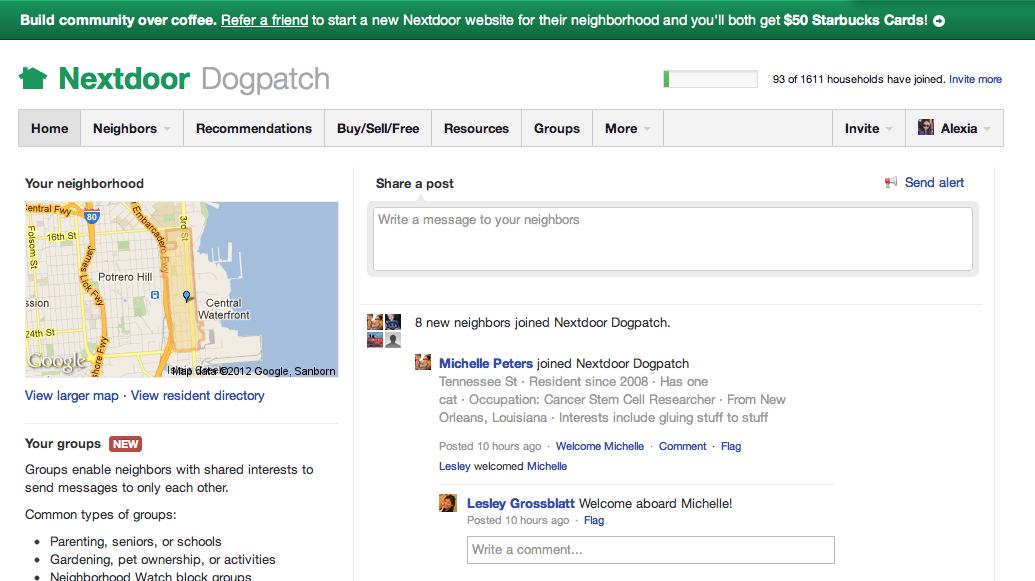Localized social network Nextdoor is announcing an $18.6 million dollar round today, led by Benchmark Capital and followed on by DAG Ventures, Greylock Partners and Shasta Ventures. Investment bank Allen & Company, Pinnacle Ventures, Rich Barton, Anthony Noto and Dave Goldberg also participated in company’s Series A round.
The Allen & Co. participation is particularly unsurprising, seeing as though Nextdoor was one of the chosen presenters at this year’s Sun Valley conference.
Attempting to conquer the same social/hyperlocal space as Patch and more niche apps like Yardsale, Nextdoor, which launched to the public last October, lets people create Facebook group-like communities for their neighborhoods, free of charge.
From the Village Voice to Foursquare to Everyblock, everyone has tried, but the problem of how to effectively create location-based social networking is a conundrum for many reasons. In order to mitigate the largest barrier to entry, trust, Nextdoor has you verify your neighborhood address either via snail mail or via credit card — purposefully introducing friction.

Founder and former Epinions genius Nirav Tolia takes the final frontier of social, local, very seriously. “Facebook is a special company and has built one of the defining companies of our generation,” he responds, when I ask him if hyper-local social networks will ever be able to achieve mass scale, “We are fulfilling a different need – connecting people to their local communities.”
He continues, “While we’re still early in the process, we believe the desire to build stronger and safer neighborhoods is a universal one that will attract many millions of people.”
Tolia views the neighborhood as one of the original social networks and hopes that Nextdoor will eventually function as location-intensive Craigslist or Yelp. The company is currently adding 22 new neighborhoods every day and engagement seems to be exceptionally high.
The startup currently has 647k households signed in and is the “official” communications mechanism of hundreds of cities. It is processing anywhere between 150-200K neighbor messages a day.
After I recommended that my neighbor, Conner Richardson, join, he found out the ideal usecase of Nextdoor the hard way, by losing his cat Kiki and having to post a virtual flyer on the social network in case anyone found her. He was overwhelmed with the community’s response.
“That site is rad,” he told me as I was about to type this up. “We posted about Kiki and everyone tried to help. We even got a psychic healer two doors down offering to pray for Kiki. You lose your cat, the community supports you. What more could you want?” he said. Conner ended up finding Kiki two days after his post. And the psychic healer ended up calling him to check in, just in case.
“We’re early believers in social networking platform companies,” investor David Sze told me, explaining why Greylock invested in the startup, “We’re fascinated by underlying platforms in social, like Twitter, Instagram, Path and believe this will eventually expand to additional and specialized networks. We really liked the idea of bringing community back to a local level. We think Nextdoor has a chance to reinvigorate that.”
“The neighborhood is one of the original social networks,” Tolia says. In addition to wanting to make communities safer, he is noodling on monetization models that involve replacing Classifieds and providing better lead generation for Recommendations. “This is mass market,” he says, “When we show this to folks in middle America they don’t scratch their heads. ”
“The essence of getting some of these local plays right is that you have to curate the sites almost by hand,” says Benchmark investor Bill Gurley, who is thrilled to be getting to work with Greylock again. “Anyone can launch a website that’s zip code based, but if you didn’t spend the time to make sure that the communities were sustainably alive and well and vibrant it wouldn’t work out.”
Nextdoor plans on using the money for hiring, like every other startup in the Valley right now. “We will remain laser-focused on building the best product for our users,” Tolia says. “The financing will enable us to accelerate the hiring of talented engineering and product folks and continue to invest in the long-term prospects of our business.”
“We’ve spent two years testing and tweaking the product to make sure that on Nextdoor, neighbors feel comfortable sharing online the sorts of things they would feel comfortable sharing offline,” he explained. Well, it sure worked out for Kiki.
